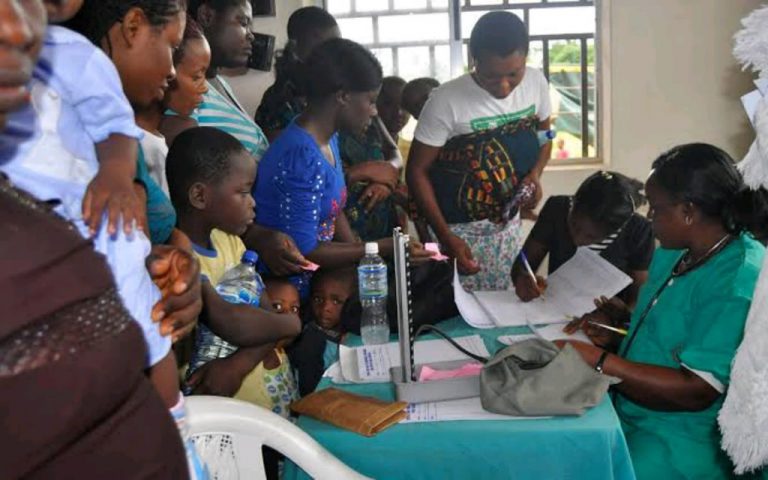Innovation, technology to save primary health care
During her last visit to the primary health center (PHC) beside the market in Jakande estate, Isolo in Lagos State, Funmi Oladimeji wondered when things will change. For the past eight years she has been using the facility, nothing worthwhile has changed. The same routine of submitting a card while she waits for her number […]

Typical Nigerian primary health center during the routine immunization exercise
During her last visit to the primary health center (PHC) beside the market in Jakande estate, Isolo in Lagos State, Funmi Oladimeji wondered when things will change.
For the past eight years she has been using the facility, nothing worthwhile has changed.
The same routine of submitting a card while she waits for her number to be called, weighing her child, going in to see the nurses who attend to her children for immunization before she bids them farewell till the next appointment.
To her, comparing the facility to the private hospital where she attends to her health needs is like comparing the earth to the sky.
She kept saying, when will the politicians start using a PHC for their health needs so that they can improve it.
In 1978 when primary healthcare was officially launched, it had the ultimate goal of attaining better health services for all.
To this end, the Executive Secretary of the National Primary Healthcare Development Agency (NPHCDA), Dr. Faisal Shuaib recently emphasised the need to “leverage technology to strengthen data management, supply chain and remote access to health services”.

Not exclusive to rural communities
Speaking recently during the 2020 future of health conference organized by the Nigeria health watch, the Editor-in-Chief at Nigeria Health Watch, Adaobi Ezeokoli dispelled the notion that primary health care is the exclusive need of rural communities adding that urban settlers equally need a functional PHC.
She noted that primary health care is capable of meeting more than 70 percent of people’s health needs while insisting, “Primary healthcare is the basis by which we hope to achieve universal health coverage.”
During the event themed, “Innovation: Improving Health And Scaling Up Healthcare Access”, the speakers harped on the importance of innovation in improving healthcare access.
According to them, it is important for innovations to bridge the gap between the health care provider and the populace.
These innovations need to be supported by an enabling environment that provides the adequate policy instruments that enable the growth of sustainable and scalable health solutions that ultimately deliver accessible and affordable health for all.
The head of operations at MobiHealth International, Dr Tanzeen Rizvi said, “I will be interested to see how technology can shape the way we will access healthcare in the future. Innovations and the most latest technology is important in primary health facilities, to not only improve the access of care, but also to improve their disease outcomes.”
Dr Rizvi insisted that with the use of telemedicine, most of the non-communicable diseases in Nigeria such as malaria can be treated even without physically seeing a doctor, thereby reducing the burden on the PHC facility.
In her contribution, the Director Research and Follow-up Programmes at Latika Roy Foundation, Dr Shubha Nagesh, stressed the need for innovation in primary healthcare for the disability community.

Lacking capacities
“Primary health care addresses the majority of a person’s healthcare needs throughout their lifetime and in fact has been described as the pathway to universal health care, but for people with disabilities particularly children, we know the diagnostic capacity is lacking. And this is a huge gap because staff at primary health facilities are not trained to understand disabilities, pick up red flags, or provide therapy intervention. In reality at primary healthcare levels, diagnosis of disabilities remains the weakest link.”
According to one of the speakers, the Founder and CEO, Doctoora e-health Limited, Dr Adebowale Odulana, primary healthcare is actually a philosophy that goes beyond the facility and encompasses providing basic health care needs to the people adding that technology and innovation can only work with collaboration between innovating partners.
“How do we integrate healthcare to make sure that people are not totally left out of the safety net?” Odulana said.
“We need to focus on what the community and the individuals need. This requires a lot of collaboration from everybody.”
